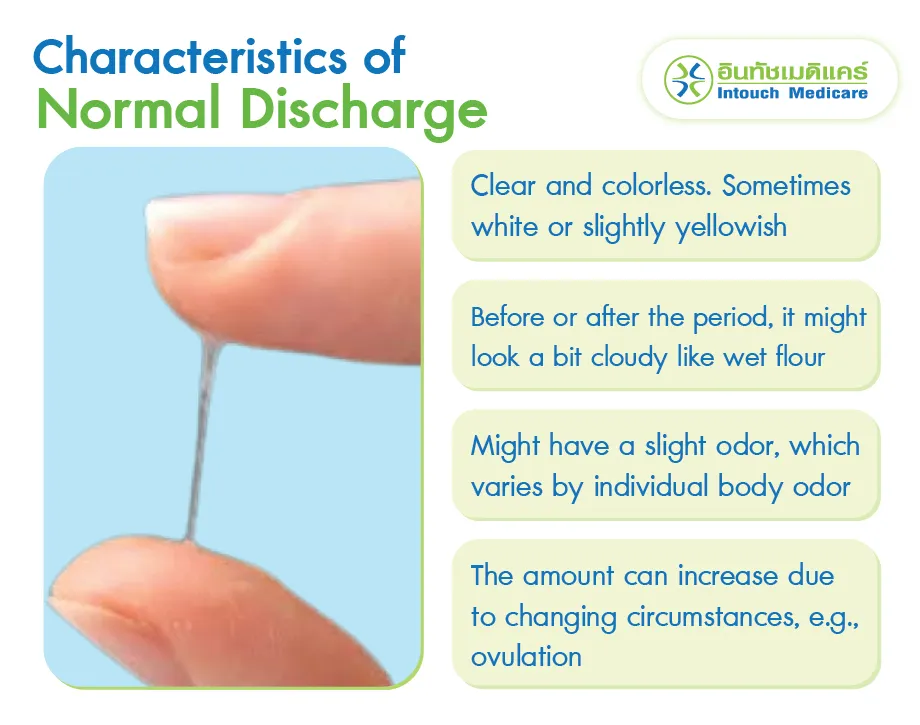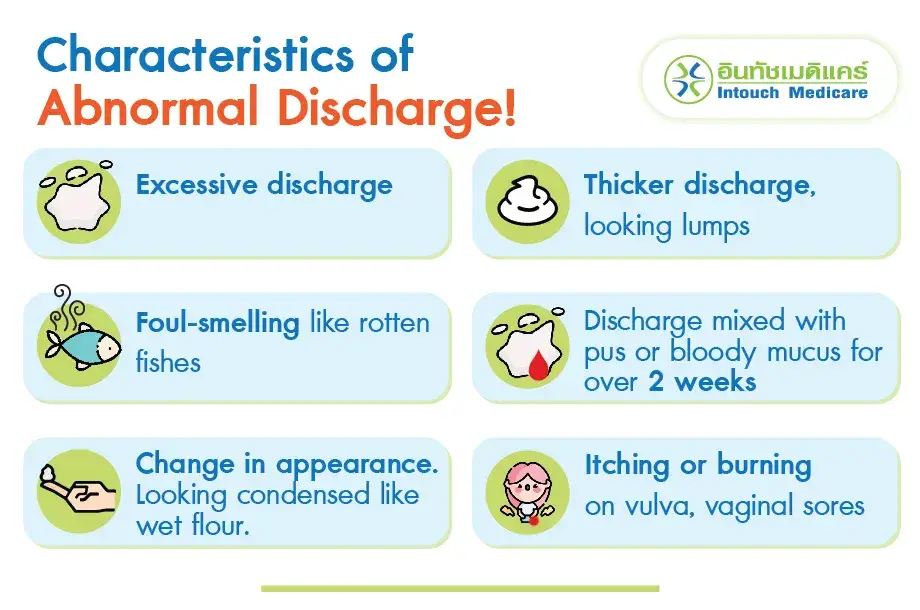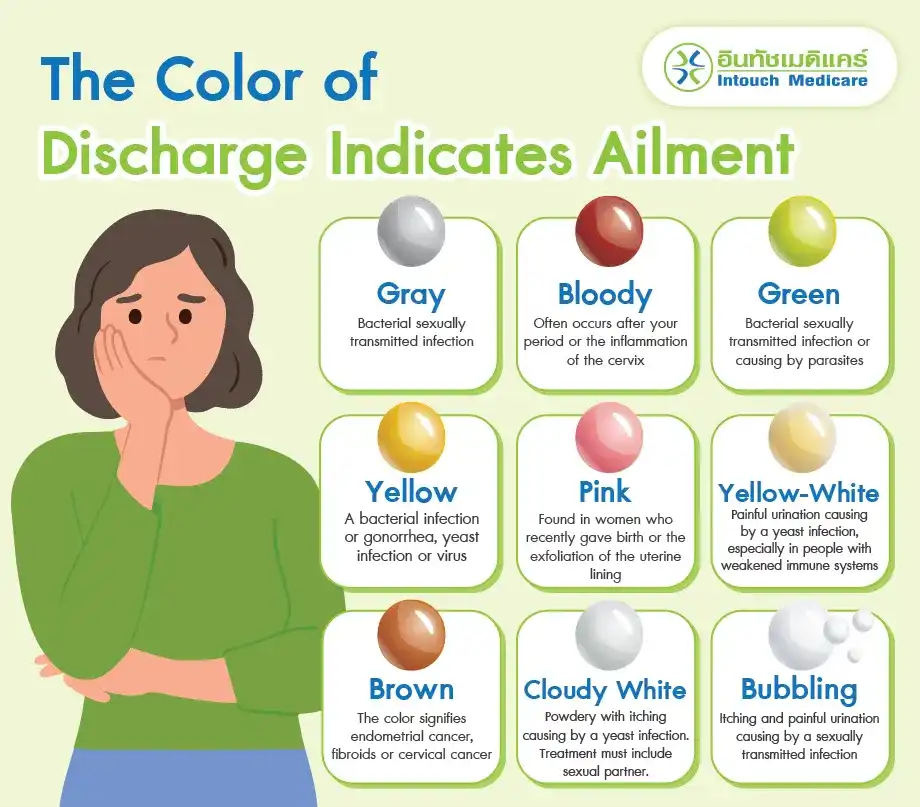What do Normal and Abnormal Vaginal Discharge Look Like? What Women Must Know!?
Last updated: 18 Sep 2024 | 35996 Views |

Encountering vaginal ‘discharge’ is typical among women, particularly those in their reproductive years. However, If the discharge does not affect your well-being, it is considered normal. On the contrary, the discharge that causes any unusual symptom can signify an ailment, an internal examination or consulting a doctor is therefore advisable to identify the cause and receive proper treatment.
In this article, we will help women clarify the nature and symptoms of normal and abnormal discharge, so that health problems can be avoided.
Interesting articles about vaginal discharge
What is Vaginal Discharge?
Vaginal discharge is a fluid that seeps out of the vaginal area. It typically looks clear, not bloody or pus liked. Most of the time, it looks like white or cloudy mucus, similar to wet flour, and isn’t very much.
This discharge helps to lubricate the vaginal area, thus preventing dryness and irritation. It often happens around your menstrual cycle. Discharge can be classified into two distinct types, which are normal discharge and abnormal discharge.
|
This symptom is most common in women of reproductive ages (from 15 to 49 years) because these are the period female hormone levels are higher compared to other age groups.
What are the Causes of Vaginal Discharge?
Vaginal discharge happens when secretions from the vagina, cervix, and nearby areas mix together. The appearance of discharge varies based on your body’s state and could signal something unusual.
What is Normal Vaginal Discharge Like?

Normal discharge usually looks clear and colorless. Before or after the period, it might be white and a bit cloudy like wet flour, because of hormonal changes. It might also have a faint odor, which varies from person to person.
|
If your discharge seems unusual and comes with itching or a burning sensation, it could be a sign of internal problems.![]()
What is Abnormal Vaginal Discharge Like?
If you notice that your discharge has changed from its normal appearance, please be aware that it could be a sign of something abnormal. So, keep an eye out for these changes.

Excessive Discharge
If your discharge seems excessive, it is questionable that it could be abnormal discharge.
Change in Appearance
If your discharge seems different, such as looking thicker or cloudy like wet flour or milk stain or having bubbles or white lumps, it is considered abnormal discharge.
Unusual Color
If the color turns yellow, green, or condensed white, it might indicate an infection, which can be caused by a sexual partner or an insertion of foreign object into the vagina. In case the discharge looks brown, it is just the old blood from your period.
Change in Smell
A change in smell can indicate a problem. It could be a foul-smelling discharge caused by an infection or odorless discharge from a yeast infection.
Other Symptoms
If there is any other symptom, such as itching, burning during urination or redness in the groin area, it is advisable to see a doctor.
What Does the Color of Vaginal Discharge Mean?

Gray
Gray discharge can reflect a bacterial infection, by which must be examined to indicate the type of bacteria. In case it is caused by a sexually transmitted infection, a treatment is necessary for both you and your partner.
Discharge with Blood and Smell
This often occurs following your period or it could also indicate an infection in the cervix.
Green
Green discharge is usually accompanied by pain, itching or aching during urination or sex usually causing by a bacterial infection, a sexually transmitted infection or parasites.
Yellow
Yellow discharge that is also itchy might have been caused by a bacterial infection, gonorrhea, a yeast infection or a virus.
Pink
Pinkish discharge is usually found in women who recently gave birth. The coloring indicates the exfoliation of the uterine lining.
Yellow-White
If you encounter it with painful urination, it might have been caused by a yeast infection, particularly among people with a weak immune system.
Brown
Brown discharge with pelvic pain, painful urination or pain during sexual intercourse requires a thorough examination, as it might signify endometrial cancer, fibroids or cervical cancer.
White and Cloudy
Discharge that looks powdery with itching and a burning sensation around the vagina generally caused by a yeast infection. A proper medication must also include your sexual partner.
Bubbling
Bubbling discharge with itching and painful urination might be caused by a sexually transmitted infection.
When to See a Doctor About Your Discharge?
If you are encountering itching, aching, burning or having sores or lumps.
If the discharge has an uncommonly foul smell.
If it is excessive or forming into chunks.
If the color becomes different from before.
If it looks bloody outside of your normal period.
If you have lower abdominal pain or an accompanying fever.
|
Abnormal discharge can be caused by several issues, such as a yeast infection, cervical cancer, bacterial infections or sexually transmitted diseases, etc.
Don’t be shy! Having discharge is truly normal for ladies. It’s important to keep your intimate area clean to prevent infections. However, if your discharge is obvious, don’t make it a secret, as it might signify an ailment. Reach out and see a doctor to get the right medication.
Interesting article
For more info and to make an appointment.
Hot Line 081-562-7722
Composer: Mr.Achawin Thamsoonthorn
Last edited : 17/09/2024
Images may be used without prior permission exclusively for educational or informational purposes, as long as proper credit is given to intouchmedicare.com




